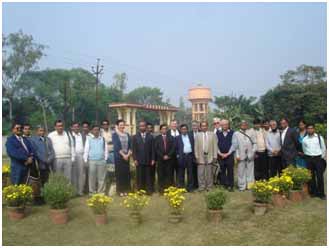Will climate change affect Potato Late Blight?
 As reported in our October 2009 edition of The Leaflet, Dr Jo Luck’s (DPI Victoria) project on climate change has received additional funding from the Asia Pacific Network for Global Change (APN) to undertake additional research in to the impact of climate change on key pests and diseases of major crops in the Asia Pacific region.
As reported in our October 2009 edition of The Leaflet, Dr Jo Luck’s (DPI Victoria) project on climate change has received additional funding from the Asia Pacific Network for Global Change (APN) to undertake additional research in to the impact of climate change on key pests and diseases of major crops in the Asia Pacific region.
During December, Jo held the first workshop for this project at Bidhan Chandra Krishi Viswavidyalaya University (BCKV), a state agricultural university in Kalyani in the Nadia district of West Bengal State, 62 kilometres north of Kolkata. This preceded a national symposium on ‘Symposium on Climate Change, Plant Protection and Food Security’ which was also held at BCKV, from 17-19 December 2009.
The main objectives of the workshop were to:
- assess the research being done on climate change and pests and diseases of important crops in the Asia Pacific Region
- agree on a common crop and disease to focus on as a project case study, and
- review the agrometeorology and pest modelling tools and historical data sets from India, Bangladesh and Australia as a foundation for this project.
After the formal welcome addresses from key university staff, Jo was invited to introduce the project and discuss its objectives and emphasised the need for a single crop and disease focus for the network to be successful. The APN representative from Bangladesh, Professor G. Miah explained the structure and function the APN and how this project fits into the APN portfolio.
Agrometerologists discussed the climatic variables already affecting Bangladesh, such as severe cyclones in the Bay of Bengal, increasing temperatures increasing precipitation, increasing intensity of floods and droughts and increasing sea levels with rising salinity in soil a major concern for Bangladesh. In India, the rising temperature was considered more limiting and expected to negate the CO2 fertilisation effect despite the higher transpiration efficiencies. The general approach adopted at the workshop was to identify the climatic risks for each country and then determine how current practices and policies can be adapted to reduce these risks.
After hearing presentations from each country on areas of interest and expertise, a break-out session was held to determine which crop and disease could be a common focus for the project, using criteria such as the economic significance of crop, severity of the disease or pest, evidence of changes to distribution or severity, project team capability and level of background data. After some discussion, a consensus was reached that Potato Late Blight (Phytophthora infestans) would be the common disease for the network to focus on with Potato Virus Y and Potato Leaf-roll Virus as secondary priorities.
The Australian potato industries are worth in excess of $400 million annually. While late blight does occur in Australia, outbreaks have been sporadic, occurring in some localised areas in the South Eastern States. Australia, however, is one of the few countries that does not have the new aggressive strains of the pathogen and there is concern that these strains may reach Australia, having established as close as PNG. Incursion of new strains into Australia could result in a greater reliance on fungicides and will undoubtedly affect national and international trade. We are interested in determining whether a projected increased frequency of severe weather events will increase the risk of entry of this pathogen or exacerbate outbreaks of the endemic strains in Australia.
Overall, the workshop exceeded expectations in terms of consensus on a single disease focus and the willingness to cooperate towards a common goal. A strong case study will be developed over the next 12 months to demonstrate the effects of late blight on a global food staple, and how the increasing intensity of droughts and floods may alter the severity and distribution of this disease, in the three member countries. This project will link to a larger ACIAR project Management of Potato Late Blight in PNG led by DPI Victoria’s potato late blight expert, Dr Dolf De Boer, through future interactions at APN project workshops.
Image:
APN workshop participants, BCKV, Kalyani.
Article written by Jo Luck

